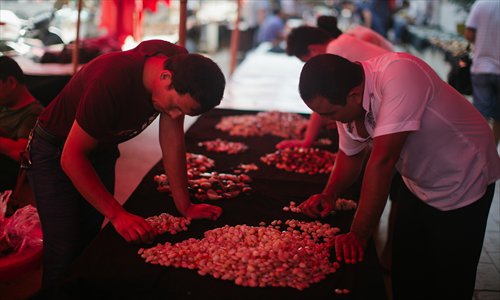Authorities closely watch Central China town suspected to be ‘transfer station’ for would-be jihadists from Xinjiang

Uyghur vendors examine jade in Zhenping's jade market. Photo: Li Hao/GT

A Uyghur boy prays in a temporary mosque in Shifosi township. Photo: Li Hao/GT

When Ehmed (pseudonym), a Uyghur jade vendor, came home from work one day in June, he found a dozen or so armed police officers had surrounded his home in Shifosi township, Zhenping county, Central China's Henan Province.
His wife and daughters were all nervously waiting for him, the younger ones sheltering under their mother's arms.
A police officer approached him, asking for his name and occupation and whether he could provide information on his neighbors.
It only occurred to him then that the other tenants, three Uyghur families that shared the rental house with his family, may have been involved in terror activities, possibly including making bombs.
The county of Zhenping, which has a large Uyghur population, has been closely watched by China's terror experts, who have singled this place out as a "transfer station" for would-be jihadists traveling to fight in the Middle East.
"It shocked me and my family. They appeared to be normal, just like us. We didn't talk much. People here are constantly coming and moving away," Ehmed, a bulky man in his fifties who moved to Shifosi in 2014, told the Global Times. He declined to reveal his real name or more information about his detained neighbors.
Ehmed's house at Hezhuang village in Shifosi township was a crude three-story bunker compound with unpainted concrete exterior walls and green wooden doors. The second and third-floor windows were sealed with iron bars to make them "burglar-proof."
Ehmed's family rented the two rooms on the first floor while the three detained families occupied the second and the third floors. The rooms had bare concrete floors and scant furniture. Ehmed's entire family of five people sleeps in the same room with no bed but an old, dirty mattress on the floor.
The stairs were cordoned off by the police. Ehmed's family was ordered to move out within a month as the rental certificate of the residence had been permanently repealed.
Hezhuang village has many such compounds, a majority of which are rented to Uyghurs, roughly 70 percent of whom come from southern Xinjiang's restive Hotan area.
The county of Zhenping, a jade carving industry hub, is known to be one of the largest Uyghur settlements in China outside of Xinjiang. At its peak in 2007, the county was home to more than 4,000 Uyghurs, but the number has sharply declined to around 1,800 since last year.
Tough times
The Global Times interview with Memet Eli was conducted in the dimly-lit control room of the Tianxia Yuyuan Jade Market, which has computer screens lining its walls showing the market from a dozen angles.
To help Uyghur jade dealers better cope with life in Zhenping, local government transformed two warehouses into a jade market designated specifically for Uyghurs - the Tianxia Yuyuan Jade Market.
Eli, 32, has been helping his brother run a bus company and the jade market for the past few years. He estimated that roughly 100 or so Uyghur workers arrive in or leave Shifosi every week.
Every Monday, Wednesday and Saturday, a bus from Hotan arrives at Shifosi and heads back later in the night. Every Wednesday and Friday, a different bus departs Shifosi for Suzhou, Jiangsu Province.
Eli's company rents out each stand out for 10 yuan ($1.50) per day and their team regularly patrols the market.
"The government has given us a lot of help, so that we can afford to rent the stands out at a very low price," Eli told the Global Times.
He also admitted that the number of Uyghurs coming to Zhenping has been declining since last year. Of the market's 228 stands, half are now vacant, leaving one of the two warehouses almost empty.
Part of the reason is the sluggish economy, Eli said. As jade market shrinks, the price of Hotan jade fell sharply in 2014 and has not shown any sign of rebounding this year.
"Business is not as good," Eli said, tilting his head to the computer screen. "Some of the dealers can sit still for days without selling a single stone."
He paused for a moment and added, "Plus, there have been constant incidents."
When asked about the specifics of these "incidents" and whether he was talking about terror activities, Eli looked away, embarrassment and annoyance plain to see on his face, and remained silent.
Jihadist crossroads
In an earlier report published by the Global Times, Zhang Shaoying, a scholar with the Research Center for Geopolitics and Anti-terrorism under the Yunnan Academy of Social Sciences, said that many would-be jihadists in China who left Xinjiang to join jihad in the Middle East traveled via the city of Nanyang in Henan Province.
He later confirmed that he was referring to Zhenping, a county under the jurisdiction of Nanyang.
"Zhenping was like the 'transfer station' in their journey. They would receive supplies or financial support from friends or some underground groups. From there, they would decide which route to take next. One option is to cross into Southeast Asian countries like Thailand and Malaysia and then travel to Turkey to go to Syria or Iraq. The other option is to travel northwards to Heilongjiang Province and cross into Russia, and from Russia to Central Asia," Zhang said.
The conclusion of Zhang's research cannot be immediately and officially verified as local police and religious affairs authorities declined to speak to the Global Times.
But locals contacted by the Global Times confirmed that the authorities have bolstered their security presence in the community.
For a start, there has always been cooperation between Eli's bus transportation company and the local police, in which all passengers are required to register with the police.
A checkpoint has been established on the road to Shifosi township. A local taxi driver, who refused to give his name, said police officers stop his car if they spot a Uyghur in it.
"They would ask for his ID for background check," the taxi driver said, adding that he doesn't like to have Uyghurs for customers as "they spoil the business."
In Hezhuang village, surveillance cameras can be seen sprouting from walls next to air conditioning machines on the bunker compounds. In one 50-meter stretch of alley, eight cameras can be seen perching on poles with their lenses trained on every front door. The cover of an electrical box sitting below a second floor window reads "For Police Use Only."
Living apart
Ehmed's family has been living in Shifosi for almost a year.
"I used to be a farmer in Hotan but the land I had was too small to even support myself. I had to make a living and feed my children," Ehmed said.
Even after a year in Shifosi, Ehmed's ability to speak Putonghua starts and ends with counting from one to 10. He sells raw jade at Tianxia Yuyuan Market in the morning and when the market is closed in the afternoon, he stays at home or takes temporary work on short notice.
None of his daughters are enrolled in the local school. None of his family speaks Putonghua. None have any ethnically-Han friends.
His wife hid in a separate room during the interview, possibly to avoid being seen by a stranger.
Ehmed's family are typical of many Uyghur migrant workers in Zhenping. Uneducated and impoverished, they migrate around the country trying to make a living, depriving their children of the opportunity of continuous education.
Their community is often close-knit, while at the same time separate from the Han-ethnic neighborhoods. The Uyghurs have their own markets, their own restaurants, their own hotels and their own taxi services. Their lives and the lives of the Han locals are like two parallel lines - close but never intersecting.
Nearby Han residents interviewed by the Global Times said they "live in the same neighborhood but are like total strangers."
Some said they are concerned, if not terrified, to learn that some of their Uyghur neighbors might be jihadists.
Homesickness
Ehmed and nearly all the other Uyghur men in Zhenping attend services led by local imam Exmet Yusun, who hosts five prayer sessions a day, and a larger service every Friday, which roughly 500 people attend.
Before coming to Zhenping eight months ago, Yusun, 43, worked as an imam in Hotan for 18 years. He was specially selected by the Zhenping government because of his experience and his good record.
During the prayers, Yusun, who wears a skullcap and a white gown, would recite verses from the Koran in Arabic and preach the virtues of being caring, forgiving, benevolent and, most importantly, staying away from jihadist thoughts.
"People come to me with their problems. They come to me if there is an argument or a fight," he told the Global Times. He denied that there are any jihadists in his community.
Like many other Uyghurs in Zhenping, Yusun doesn't speak Putonghua.
"I earned 300 yuan ($49) per month in Hotan as an imam and here my monthly salary is 4,500. But I still feel life is easier back home. I have family that can support me, land to take care of and small business to tend to beside my cleric work," Yusun said.
Ehmed, too, spoke of eventually going home.
"I am saving money for my family to travel back," Ehmed said.
He admitted that his business is deteriorating but seemed to face it stoically.
"Such is life. Allah gives, and he also takes away."
Newspaper headline: On the way